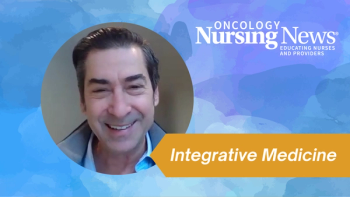
Adult/Pediatric Team Collaborations Improve Transitions to AYA Cancer Care
Maria C. Velez, MD, shared that teamwork between pediatric and adult care teams can make the transition of care smoother for AYA patients.
Oncology nurses and advanced practice providers (APPs) can help pediatric as well as adolescent and young adult (AYA) patients navigate cancer care by adapting communication and support to the patient’s developmental stage and by fostering a smooth transition to adult services, according to Maria C. Velez, MD.
Velez, who practices pediatric hematology/oncology at Manning Family Children’s in New Orleans and is a professor in the Department of Pediatrics, Division of Hematology/Oncology, at the Louisiana State University Health Sciences Center in New Orleans, emphasized the importance of collaboration between pediatric and adult care teams, ensuring patients meet their new providers and incorporating feedback from patients to improve processes.
Pediatric oncology, Velez noted, is distinct from adult oncology because it encompasses a wide range of developmental stages, from infants to older adolescents, each with unique needs. She added that as patients grow, supporting independence and helping them manage new responsibilities become critical aspects of care.
Velez also serves as the current president of the American Society of Pediatric Hematology/Oncology (ASPHO).
Oncology Nursing News: How can oncology nurses and APPs create a smooth and supportive transition for AYA patients entering adult care?
Velez: Continue collaborating, know your network, and know the partners in the adult world. Establishing all that will smoothen the transition for our patients. Many times, one of the ways to do that is helping the patients get an appointment visit and learn from the new team. Then we bring them back to get some of the feedback—and we always learn from our patients—so incorporating all that feedback helps us continue to improve how we
In terms of workflow, what should oncology nurses and APPs who work with adults know when transitioning to pediatric oncology?
It’s a different world. I have to say that. We always appreciate the expertise that they bring to our team, and we welcome all this to continue helping us. Unfortunately, cancer is not going anywhere. In our subspecialty [pediatric hematology oncology], we continue supporting not only our own colleagues and members, but all the other specialties, so we continue to offer the best care to patients.
What should all oncology nurses and APPs understand about pediatric cancer?
It’s different from adults.
Subsequently, the needs of adolescent and young adults include helping them with independence and helping them manage and navigate some of the system needs and hiccups that could happen as they become of age to make their own decisions. It is fascinating that we take care of all these age groups, so we need to help them with that transition vs having just an adult that makes decisions, or we just help to make those decisions. That is part of what we do in pediatric oncology that makes us different and special, but different in a good way.
This transcript has been edited for clarity and conciseness.
Newsletter
Knowledge is power. Don’t miss the most recent breakthroughs in cancer care.




































